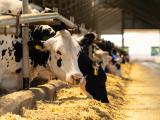Nov 29, 2004 (CIDRAP News) Irradiating fresh cilantro and sprouts can reduce levels of potentially dangerous microbes without affecting flavor or other sensory attributes, according to two studies published recently in the Journal of Food Protection.
Food irradiation entails exposing food to ionizing radiation in the form of gamma rays, high-energy electrons, or x-rays. The Food and Drug Administration (FDA) has approved low-dose irradiation of fresh fruits and vegetables to inhibit sprouting and control insects, but not to reduce pathogens. Similarly, the FDA has approved irradiating seeds to limit sprouting, but has not approved irradiation of sprouts to control pathogens. (Dried herbs and spices can be irradiated at higher doses to control pathogens.)
Denise Foley and colleagues at Chapman University in Orange, Calif., examined the effects of irradiation on fresh cilantro. They note that the FDA identified cilantro as one of the products most often contaminated in tests of imported produce in 1999. They inoculated cilantro with Escherichia coli O157:H7 and then exposed it to a chlorine solution (200 ppm) or low-dose gamma irradiation, or both.
Chlorination alone reduced E coli counts by more than 1 log, and irradiation alone at 1.05 kGy led to a 6.7-log reduction, the authors reported. Chlorination is commonly used to disinfect produce, but it does not completely eliminate pathogens, the researchers note. The combination of chlorination and irradiation reduced E coli counts more than 7 logs.
A panel of eight trained evaluators assessed the odor, flavor, and visual characteristics of cilantro irradiated at doses of 1.05 to 3.85 kGy. They found no significant differences between the irradiated herb and nonirradiated control samples immediately or after 7 and 9 days.
In the second study, M. L. Bari and colleagues at the National Food Research Institute in Tsukuba, Japan, irradiated ready-to-eat radish and mung bean sprouts.
The US National Advisory Committee on Microbiological Criteria for Foods (NACMCF) has described sprouts as a special problem because of the potential for pathogen growth during sprouting. If pathogens are on or in the seed, the environment favorable for sprouting may also encourage the growth of microbes. There is no inherent step in the production of raw sprouts to reduce or eliminate pathogens, according to NACMCF literature. Contaminated seed is the likely source for most reported sprout-associated outbreaks.
Bari and colleagues note that it is hard to clean the surface of fresh produce, in part because excessive processing could release nutrients that further encourage pathogen growth. The researchers inoculated mung bean and radish sprouts with E coli and Salmonella and then irradiated them at doses of 1.5 and 2.0 kGy, respectively.
Irradiation reduced levels of both microbes to nondetectable limits, the report says. There was no significant impact on the color, firmness, or overall visual quality of the sprouts. The researchers did note that the vitamin C content was gradually reduced with higher radiation doses. However, they determined overall that irradiation could be useful in reducing pathogens on sprouts while retaining acceptable food quality.
Foley D, Euper M, Caporaso F, et al. Irradiation and chlorination effectively reduces Escherichia coli O157:H7 inoculated on cilantro (Coriandrum sativum) without negatively affecting quality. J Food Prot 2004: 67:2092-8 [Abstract]
Bari M, Al-Haq M, Kawasaki T, et al. Irradiation to kill Escherichia coli O157:H7 and Salmonella on ready-to-eat radish and mung bean sprouts. J Food Prot 2004: 67:2263-73 [Abstract]




















